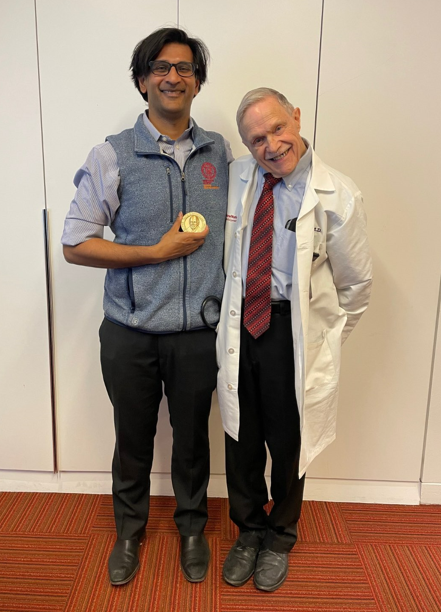
Pictured left to right: Drs. Arnab Ghosh, Oliver Fein
At the David Rogers Health Policy Colloquium, which is a forum for invited speakers to present their research, clinical programs, or demonstration projects, followed by a discussion with students, faculty and staff, Dr. Arnab Ghosh, an Assistant Professor of Medicine in the Division of General Internal Medicine, gave a presentation titled “Climate and Health Policy: Where to from here?” urging policymakers, health professionals, and communities to consider climate change a public health emergency.
Dr. Ghosh explained how climate drivers like heatwaves, extreme precipitation or rising sea levels influence exposure pathways, such as air quality and food systems, which in turn lead to health outcomes ranging from respiratory illness to mental health challenges. He stated the need for mitigation (reducing the causes of climate change, like CO₂ emissions) and adaptation (responding to the effects we’re already experiencing). In healthcare, this could mean redesigning infrastructure, adjusting medication protocols or building community cooling centers.
Dr. Ghosh mentioned three reasons why we need climate health policy. First, climate events often worsen market failures, particularly in insurance and municipal finance. For instance, a study suggested that rising sea levels in Florida threaten to erode property tax revenues that many local governments depend on to fund essential services that ensure healthy communities. Second, the climate crisis doesn’t respect political boundaries, meaning that solutions must be systemic, collaborative and coordinated across jurisdictions. Third, the consequences of climate change cut across multiple sectors, affecting agriculture and infrastructure to public health and fiscal policy. These effects demand cross-sectoral policy responses that can address the complexity of the crisis and build resilience across society, leading to direct and indirect health benefits.
To improve climate health policy and resilience efforts, Dr. Ghosh collaborated with the former federal Office of Climate Change and Health Equity within the Office of the Assistant Secretary of Health of the Department of Health and Human Services to develop the Climate Resilience for Healthcare (CR4HC) Toolkit. Designed for long-term climate resilience, the toolkit was designed to help healthcare facilities assess risk and build resilience across various climate threats. Resources such as HEAT.gov and the U.S. National Heat Strategy 2024-2030 offer guidance for local, state and federal adaptation planning particularly for extreme heat.
Looking ahead, Dr. Ghosh emphasized the development of climate-informed health quality metrics, regulatory reform for emergency preparedness and equity-focused solutions. In closing, he reminded us “there’s a desire and creativity to adapt to climate and health policy. It’d be crucial to ensure that our healthcare system is accountable and prepared.”

